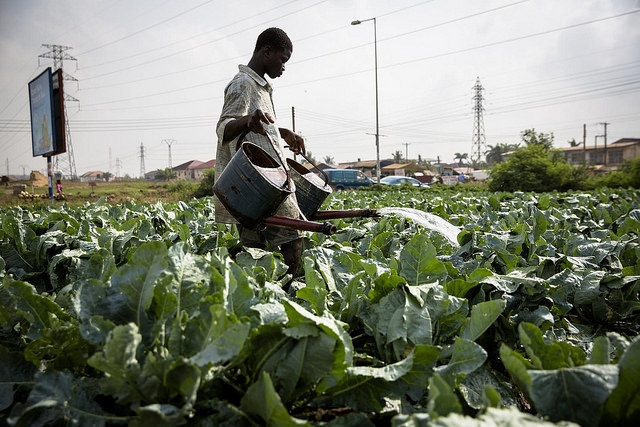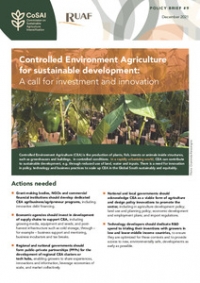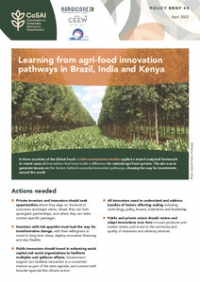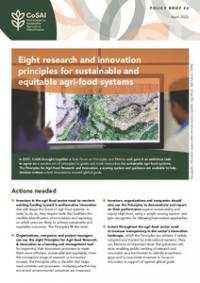Foreign direct investment in African agriculture could bring great benefits, but there are risks too.
“Buy land, they’re not making it anymore.” Mark Twain’s famous remark may be over a century old, but the allure of a patch of earth to call your own still remains potent.
Nowhere is this more true than in sub-Saharan Africa where, for many, land ownership is still seen as the key to a secure income. Against a bitter history of colonial appropriation in many countries, the lure of land still stirs deep emotions. Many African governments have tried to address historic grievances, but the results have been mixed. African agriculture remains in the doldrums, chronically underproductive by global standards.

So the news that foreign money is now pouring into African agriculture should be welcome. Investors are leasing land all over the continent with the intention of creating modern farms with high crop yields. It could be a win-win: bringing in new technology and infrastructure, creating jobs and boosting food supplies. Instead it is more commonly characterized as a “land grab” – a cynical attempt to further exploit African resources for the benefit of others.
Curiously the debate over foreign direct investment in African agriculture has focused almost exclusively on access to land. Water has been largely ignored – until now. New research, commissioned by the African Ministers’ Council on Water (AMCOW) and presented this week by International Water Management Institute’s Tim Williams at a session during World Water Week in Stockholm has attempted to tease out what the implications of the trend might be for the continent’s water and those who depend upon it.
Currently only 5% of sub-Saharan agriculture benefits from irrigation. New investments potentially offer opportunities to dramatically increase this. Nonetheless, questions remain about the motives of investors and the actual contributions of foreign direct investment (FDI) in agricultural land to the national development of host countries.
What are their actual impacts on national food security, local livelihoods, on water quantity and quality, and on essential ecosystem services? Unscrupulous large-scale land acquisitions and inadequate consideration of the actual and potential uses of water for the legitimate pursuit of customary livelihoods and lifestyles have the potential to lead to significant inequity, inefficiency and environmental problems.
How much thought is given to these investments?
Overall, says Williams, around 3.4 million hectares of land in 22 sub-Saharan African countries is currently under lease to foreign and domestic investors – about the size of Nigeria’s Benue state. But remarkably only 5% of this currently under productive use.
Williams and his team looked at a half dozen countries in more detail to see if water had been taken into account when land had been leased. In all 6 water and land were governed separately. Water access rights were included in deals struck in 4 countries, but in two rights were not discussed at all. Only in Tanzania was there prior consultation with existing water users.
“Water is neglected or an afterthought,” said Williams, and he urged governments to do more to ensure that the legislative frameworks that underpin land leasing were robust enough to ensure that water rights were properly considered.
“Land given out by governments for FDI is often thought to be under underutilized,” he added, “but it may, in fact be being sustainably used by local people.” This needs to be better recognized.
During the session discussion, Claudia Ringler, of the International Food Policy Research Institute and a research leader in the CGIAR Research Program on Water, Land and Ecosystems (WLE) raised concerns that many catchment agencies don’t deal with groundwater. There is growing interest in its potential as a critical resource for sustainable development, so how it will be included in future land-lease negotiations will be important. She also highlighted the fact that women, often not the main landowners in sub-Saharan Africa, were rarely consulted when such deals take place, but may be the main stewards of water in the community. Also neglected were young people. Land leases can last up to 50 years, so the input and opinions of youth should be an important part of the process.
Oseloka Zikora of AMCOW, who introduced the session summed up the challenge. “When people are looking for land they are actually looking for water – free water” he said. Governments must respond to the challenge to ensure that the benefits of new investment are fairly shared.
Research partners: IWMI/WLE, GRID Arendal, FAO, UNEP
This week, Thrive and WLE colleagues are at Stockholm World Water Week 2015. Opinions and analysis will focus on this year's theme of "water and development."
Resources
Analysis of impacts of large-scale investments in agriculture on water resources, ecosystems and livelihoods in sub-Saharan Africa















